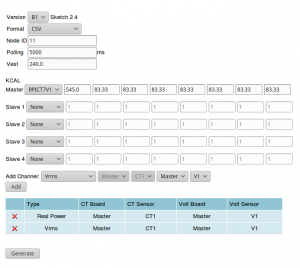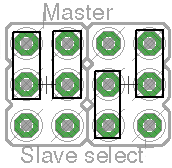RPICT Stacking
RPICT7V1 RPICT4V3 (versions 2) and RPICT8 can be stacked together to expand sensor capacity.
5 boards can be stacked together to offer up to 35 SCT sensors capacity on one Raspberrypi.
In the stacked configuration only one board has a Microcontroller which is the Master board. For the slave board the microcontroller should be removed.
Hardware Configuration for slave
2 Steps to configure a single board or master board as slave:
1 - Remove the 28 pin microcontroller.
2 - Setup the jumper as shown below.
Always place the Master board at the bottom of the stack. The order of other boards above the master can be any.
Software Configuration
The master board can be configured over serial.
Using a serial line terminal program one can configure the following:
- Polling interval - Output format (csv or emoncms) - Calibration values (Voltage and Current) - Voltage/current combinations for real power computation. - Output channels
The documentation for serial configuration can be found on this page.
Over Serial Configuration - Sketch 2.1
Over Serial Configuration - Sketch 2.2
Over Serial Configuration - Sketch 2.3
Over Serial Configuration - Sketch 2.4
 Starting from sketch 2.4 the board can be configured with the online configurator.
Starting from sketch 2.4 the board can be configured with the online configurator.
Jumpers
There are four jumpers to configure the board as Master or Slave. The 5 possible configurations are:
| Type | Master | Slave 1 | Slave 2 | Slave 3 | Slave 4 |
|---|---|---|---|---|---|
| CS Pin | 10 | 6 | 7 | 8 | 9 |
| Jumpers | 
|

|

|

|

|


